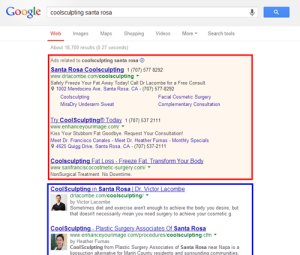Internet Marketing
Google controls a whopping 40% of the internet advertising market[1]. The total global market for internet advertising in 2014 was $135.42 billion and is expected to be around $239.87 billiion by 2019[2]. Why have companies shifted so much of the advertising dollars from print to internet advertising? Because internet advertising makes money.
Marketing your business online is all about exposure. You want to get the highest quality exposure at the lowest price. There are many ways to get exposure online. The two most popular ways to gain exposure are via paid-for inclusion and earned inclusion. Both methods are effective, but they vary substantially in their return on investment (ROI).
Google’s Anatomy
In the image below we see the search results for “coolsculpting santa rosa.” The red boxes have been added to call out the paid-for advertisements and the blue boxes call out Google’s earned (not paid-for) organic search results.

PPC Advertising
The most popular form of paid-for Internet advertising is Pay Per Click (PPC, shown above in red). PPC advertisements are brief text ads shown when the “keyword” the advertiser bids on is typed into the search box. The PPC advertiser pays their bid price to Google (or another venue of their choosing) when somebody clicks on their advertisement. Advertisers carefully select and aggressively bid on the keywords they feel their customers will use when looking for their product or service. Because many advertisers compete for the same keywords, many PPC ads are shown per page. Advertisements with a higher bid price appear higher on the page followed down the page by advertisements with a lower bid. Bids are conducted in a continuous auction format which results in market pricing for each of the ad positions.
PPC advertising is uniquely immediate, absolutely controllable and quantifiably measureable but prices can be expensive and management can be very time consuming. For many small businesses, keyword selection, budget management and campaign optimization can make PPC a burden. Third parties offer PPC management services and commonly take a fee for their work and charge a percentage of the budget for placement. It is not uncommon for competitors to click on each other’s ads to cost them money[3] and when advertisements are clicked accidentally the advertiser is still charged their bid price. Above all else when considering PPC, the advertiser should be aware that about than 75% of all Internet users are simply reluctant to click an advertisement[4]. Nonetheless, PPC is an effective means of Internet marketing, enabling the advertiser to reach their target market online.
Search Engine Optimization
Another form or Internet marketing is search engine optimization (SEO). SEO is focused on making a website rank higher in the organic section of Google (within the blue box). This is particularly desirable because more than 75% of all clicks are contained within the organic section[5]. SEO is much less immediate and controllable than PPC, but it has the ability to deliver much more high quality traffic and can cost much less, especially long term. Because the search engines protect their algorithms that determine website ranking, SEO is based on reverse engineering and best practices. There are literally hundreds of ranking signals[6] Google uses as part of its algorithm. Shown below is an example of our reverse engineering efforts. Rank is along the left column and signals are along the top. Coloring corresponds to difficulty of reproduction.
How does your website compare?
Comparing PPC and SEO
In order to make an informed decision about which Internet marketing is appropriate for your business it is important to understand the cost and benefits of both PPC and SEO. PPC is immediate and controllable but typically expensive and delivers less traffic. SEO is generally less expensive but takes longer to yield results and delivers much more traffic. When your PPC budget is exhausted, your advertisements no longer show. When you stop funding SEO activity, your ranking can degrade over time. With regard to traffic, the tables below shows the expected click rates depending on your position in the paid-for (PPC) or organic (ORG) sections.
Where is your website ranked?
Scenario
Your company has a budget of $1,000 per month to spend on Internet marketing. There are 2,000 searches for your keyword each month at the top bid price is $4.00 per click. With PPC (assuming you were the top bidder and managed the campaign yourself) you could expect to receive about 160 clicks costing you $640. With SEO (assuming you were in the top position) you could expect to see an additional 680 clicks (840 total). You could be as low as the third position to gain the same number of clicks as PPC.
Closing Thoughts
In the scenario, if your business was the PPC highest bidder, you wouldn’t be able to spend your whole budget, risking a decline in business. SEO generates far more traffic and it carries a lasting value. If immediacy is required PPC is your only option and supplemental SEO services are recommended.
If your website is anywhere beyond the first page of Google it will essentially receive no traffic and SEO would be a good investment. Like anything else that is designed to provide long term value, regular SEO is recommended to maintain your investment.
Carefully weigh your Internet marketing options to get the best return on investment. Consider the cost of the services, cost of not doing anything, and the value each new customer will bring. Consider your timeline, paying special attention to immediacy and long term value.
[1] http://www.businessinsider.com/google-spends-most-of-its-ad-budget-on-tv-2014-4
[2] http://www.pwc.com/gx/en/industries/entertainment-media/outlook/segment-insights/internet-advertising.html
[3] http://en.wikipedia.org/wiki/Click_fraud
[4] http://www.businessweek.com/magazine/content/07_46/b4058053.htm
[5] http://books.google.com/books?id=5JE-8SlrLG4C&pg=PA125 , http://www.enquiroresearch.com/images/eyetracking2-sample.pdf